职业经理人如何做出正确的选择英文版)
怎样善于做决定英语作文

怎样善于做决定英语作文英文回答:Making Effective Decisions.Decision-making is an essential skill in every aspect of life. The ability to weigh options, consider consequences, and make informed choices is crucial for personal and professional success. Here are some strategies to enhance your decision-making skills:1. Define the Problem Clearly:Before making any decisions, it's important to clearly define the problem or issue at hand. Determine the specific objectives you want to achieve and the constraints you are facing.2. Gather Information:Once the problem is defined, gather as much information as possible from reliable sources. This may involve research, consultations with experts, or simply seeking input from others.3. Analyze Options:Identify all possible options or solutions to the problem. Consider the potential benefits, risks, and costs associated with each option. Weigh the pros and cons carefully.4. Consider Long-Term Consequences:Do not focus solely on immediate outcomes. Think about the long-term consequences of each decision and how it may impact you or others in the future.5. Consult with Others:Seek input from trusted friends, family members, colleagues, or mentors who have relevant experience orknowledge. Their perspectives can provide valuable insights.6. Trust Your Intuition:While it's important to be analytical, don't ignoreyour intuition. Pay attention to your gut feelings and consider if they align with your logical reasoning.7. Take Time to Reflect:Avoid making impulsive decisions. Give yourself time to reflect on the options, gather more information if needed, and consult with others.8. Make a Decision and Implement:Once you have weighed all the factors, make a decisive choice and implement it effectively. Be prepared to adjust your decision if unforeseen circumstances arise.9. Evaluate the Results:After implementing the decision, evaluate its effectiveness. Consider whether it met your objectives and if there are areas for improvement in your decision-making process.中文回答:如何做出明智的决定。
做合理的选择英语作文

做合理的选择英语作文英文回答:Making rational choices in life is essential for ourwell-being and success. Whether it's deciding on a career path, choosing a place to live, or picking a restaurant for dinner, our decisions shape our lives in profound ways. Here, I'll delve into the art of making rational choices, drawing from personal experiences and practical wisdom.Firstly, rational decision-making involves weighing the pros and cons of different options. Take, for example, choosing a college major. It's crucial to consider factors like personal interests, job prospects, and academic strengths. When I was faced with this decision, I pondered over various majors, assessing their long-term implications. Eventually, I chose computer science because it alignedwith my passion for technology and offered promising career opportunities.Secondly, seeking advice from others can provide valuable insights. Friends, family members, and mentors often offer perspectives that we might overlook. For instance, when I was torn between two job offers, I consulted a trusted friend who provided valuable advice based on her own experiences. Her input helped me see the situation from a different angle and ultimately make an informed choice.Moreover, embracing uncertainty is part of rational decision-making. Life is unpredictable, and not every decision will have guaranteed outcomes. However, avoiding decisions due to fear of failure or uncertainty can hinder personal growth. Instead, I've learned to embrace uncertainty and view it as an opportunity for learning and adaptation.Additionally, it's essential to consider the long-term consequences of our decisions. Short-term gratification may seem appealing, but it's important to evaluate how our choices will impact our future selves. For instance, opting for a higher-paying job with long hours may provideimmediate financial benefits but could lead to burnout and unhappiness in the long run. Prioritizing long-term goals over immediate rewards requires foresight and self-discipline.Furthermore, intuition plays a significant role in decision-making. While rational analysis is crucial, our gut feelings often guide us towards the right path. There have been instances where I followed my intuition despite conflicting logical arguments, and it led to favorable outcomes. Trusting our instincts can be a powerful tool in navigating life's complex decisions.In conclusion, making rational choices is a skill that we continually refine throughout our lives. By weighing options, seeking advice, embracing uncertainty, considering long-term consequences, and trusting our intuition, we can make informed decisions that align with our goals and values.中文回答:在生活中做出合理的选择对我们的幸福和成功至关重要。
【管理英文】为自己选择最佳的领导风格
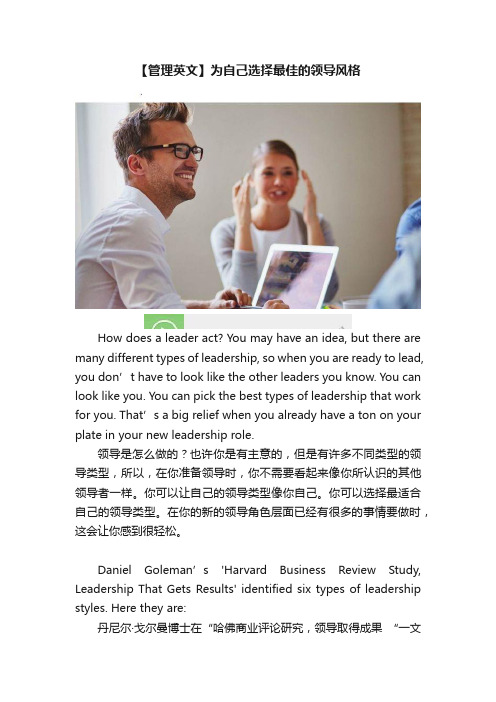
【管理英文】为自己选择最佳的领导风格How does a leader act? You may have an idea, but there are many different types of leadership, so when you are ready to lead, you don’t have to look like the other leaders you know. You can look like you. You can pick the best types of leadership that work for you. That’s a big relief when you already have a ton on your plate in your new leadership role.领导是怎么做的?也许你是有主意的,但是有许多不同类型的领导类型,所以,在你准备领导时,你不需要看起来像你所认识的其他领导者一样。
你可以让自己的领导类型像你自己。
你可以选择最适合自己的领导类型。
在你的新的领导角色层面已经有很多的事情要做时,这会让你感到很轻松。
Daniel Goleman’s 'Harvard Business Review Study, Leadership That Gets Results' identified six types of leadership styles. Here they are:丹尼尔·戈尔曼博士在“哈佛商业评论研究,领导取得成果“一文中将领导风格分为以下六种风格:1The pacesetting leader: This leader says “Do as I do, now.” Many people think this is what a leader looks like. The downside is that if you’re always doing what the boss says, there isn’t much room for your innovation.领头型领导:这种类型的领导者会说:“现在,照我说的做。
如何做出正确的职业选择英语作文
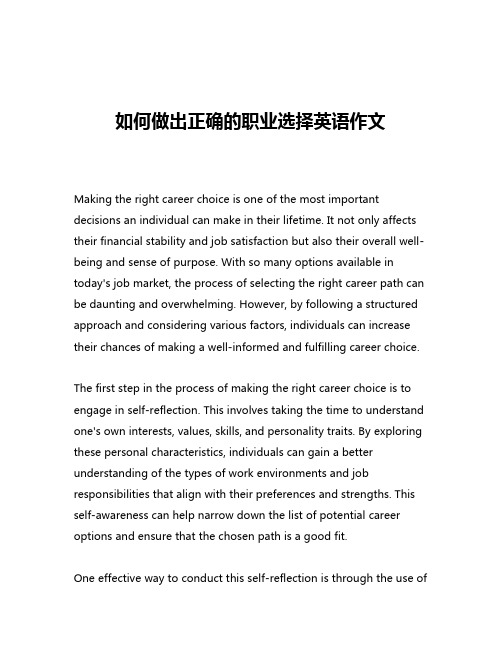
如何做出正确的职业选择英语作文Making the right career choice is one of the most important decisions an individual can make in their lifetime. It not only affects their financial stability and job satisfaction but also their overall well-being and sense of purpose. With so many options available in today's job market, the process of selecting the right career path can be daunting and overwhelming. However, by following a structured approach and considering various factors, individuals can increase their chances of making a well-informed and fulfilling career choice.The first step in the process of making the right career choice is to engage in self-reflection. This involves taking the time to understand one's own interests, values, skills, and personality traits. By exploring these personal characteristics, individuals can gain a better understanding of the types of work environments and job responsibilities that align with their preferences and strengths. This self-awareness can help narrow down the list of potential career options and ensure that the chosen path is a good fit.One effective way to conduct this self-reflection is through the use ofcareer assessment tools. These assessments, which can be found online or administered by career counselors, often involve a series of questions or activities designed to identify an individual's interests, skills, and personality type. The results of these assessments can provide valuable insights into the types of careers that may be well-suited to the individual, serving as a starting point for further exploration.In addition to self-reflection, it is also important to research and explore different career options. This can involve informational interviews with professionals in various fields, attending career fairs or industry events, or reading job descriptions and industry reports. By gathering information about the day-to-day responsibilities, educational requirements, job outlook, and earning potential of different careers, individuals can make a more informed decision about which path to pursue.Another crucial factor to consider when making a career choice is the alignment between the chosen field and the individual's long-term goals and values. It is important to reflect on what is truly important to the individual, whether it is financial stability, work-life balance, opportunities for growth and advancement, or the ability to make a positive impact on the world. By ensuring that the chosen career aligns with these personal values and aspirations, individuals can increase their chances of finding fulfillment and satisfaction in theirwork.Moreover, it is essential to consider the practical aspects of a career choice, such as the job market, employment outlook, and potential earning potential. While it is important to pursue a career that aligns with one's interests and values, it is also crucial to ensure that the chosen path offers reasonable job prospects and financial stability. By researching the current and projected demand for particular skills and occupations, individuals can make a more informed decision about the viability of their chosen career path.Networking and informational interviews can also play a crucial role in the career decision-making process. By connecting with professionals in the field, individuals can gain firsthand insights into the realities of the job, the challenges and rewards, and the skills and qualifications required. These conversations can provide valuable information that can help individuals make a more informed decision about their career path.Furthermore, it is important to be open to exploring alternative career paths and to be willing to adjust one's plans as circumstances change. The job market and the skills required for various professions are constantly evolving, and individuals may need to adapt and consider new opportunities that may arise. By maintaining a flexible and open-minded approach, individuals can increase theirchances of finding a fulfilling and sustainable career.In conclusion, making the right career choice is a complex and multifaceted process that requires careful consideration of various factors. By engaging in self-reflection, researching different career options, aligning with personal values and long-term goals, and networking with professionals, individuals can increase their chances of finding a fulfilling and rewarding career path. While the process may be challenging, the rewards of a well-chosen career can be immense, leading to a lifetime of job satisfaction, financial stability, and personal growth.。
Adutzge职业经理人的成功之道之二十七原则(doc 57)

生命是永恒不断的创造,因为在它内部蕴含着过剩的精力,它不断流溢,越出时间和空间的界限,它不停地追求,以形形色色的自我表现的形式表现出来。
--泰戈尔职业经理人的成功之道27法则职业经理人的成功之道(一):负责负责就是了解你将为什么被解雇。
优秀经理总是竭力使自己百分之百地明确自己的责任。
他知道自己能作出何种决定,他知道如何授予责任,和让自己班子的成员去作出决定。
任何人作了决定就得担起责任,必须在决策后负责到底。
这就是为什么在经营不善的公司里,人们总是推诿责任,以及为什么低效率的官僚主义会应运而生,从而轭杀决策。
在这些公司里,需要决策的问题在委员会和上层代表的官僚主义漩涡里打转转,而最后摆在某个高层人物面前,逼着他对是或否表态。
可就是这些推诿责任的人将背着此君猛烈地指责他(或她)作了错误的决策。
一个优秀经理则不然,他作出决定,并承担责任。
如果他不清楚是否应由他作出决定,他或是与上司联系,或宁可铤而走险自己作主。
优秀经理懂得,澄清模糊的责任界限的最佳途径像是作出决断,并等待别人有朝一日向他挑战。
这就是他分清责任的机会。
当然,优秀经理知道,一旦他作出一个以上的糟糕决定,就可能被“炒鱿鱼”。
负责是需要勇气的。
行动请坐下来,搞清楚你自己的职责所在。
弄明白你可以作怎样的业务决策。
最好是列出那些悬而未决的问题,并着手作出一些决定;你可以以后再向上司汇报,与你的工作班子探讨责任问题。
工作之余,与他们一起去喝上一杯,并由公司付帐。
看看谁对你的决定提出异议,然后你对决定作出必要的说明。
如果你对无权批准出差、招聘人员、培训和基本开支等事不满意,你可以去找上司谈谈,使自己在会晤后完全明确自己的职责范围。
你应该肯定公司是要你负责生产水平、销售目标、工程运行、推销期限,成本效益管理,或凡是要你负责管理的事务。
你还需要了解自己该对本部门的成功或失败负责。
如果你分不清所在领域的成功与失败的区别,应当马上辞职——这说明你要么干不好这项工作,要么就不得不推诿责任。
如何做出更好的决定英文作文

如何做出更好的决定英文作文英文回答:How to Make Better Decisions.Making good decisions is a vital skill for success in all aspects of life. From choosing a career path to managing our finances to navigating personal relationships, the decisions we make shape our experiences and outcomes. While there is no foolproof formula for making perfect decisions every time, there are certain strategies and techniques we can adopt to improve our decision-making process.1. Gather Information:The foundation of any good decision is a solid understanding of the facts and options available. Before making a choice, it is crucial to gather as much relevant information as possible. This may involve research,consulting with experts, or seeking input from trusted sources. The more information you have, the more informed your decision will be.2. Identify Your Goals and Values:Before evaluating options, it is important to clarify your goals and values. What are you trying to achieve? What is important to you in the decision-making process? Identifying your priorities will help you filter out irrelevant options and focus on those that align with your objectives.3. Consider the Long-Term:When making a decision, it is easy to focus on the immediate consequences. However, it is equally important to consider the long-term implications. Will this decision have a positive or negative impact on your future goals and aspirations? Taking a long-term perspective can help you avoid short-sighted decisions that may have unintended consequences down the road.4. Explore Different Perspectives:No two people see the world exactly the same way. By seeking out different perspectives and opinions, you can gain a more comprehensive understanding of the situation. This can help you identify potential blind spots and consider alternative solutions you may not have thought of on your own.5. Weigh Pros and Cons:Once you have gathered information and considered different perspectives, it is time to weigh the pros and cons of each option. This involves carefully evaluating the potential benefits and drawbacks of each choice. By systematically comparing options, you can make a more informed decision about which path to take.6. Make a Decision and Stick with It:After considering all the evidence and weighing thepros and cons, it is time to make a decision. This can be a difficult step, but it is important to avoidprocrastination or indecision. Once you have made a choice, commit to it and avoid second-guessing yourself.7. Evaluate and Learn:No decision is perfect. There will always be some level of uncertainty and risk involved. However, it is important to learn from both our successes and our mistakes. By evaluating your decisions and reflecting on what went well and what could have been improved, you can continuously refine your decision-making skills.中文回答:如何做出更好的决策。
如何善于决策英语作文

如何善于决策英语作文英文回答:How to Make Good Decisions.Making good decisions is an essential life skill that can help us achieve our goals, avoid problems, and live happier, more fulfilling lives. However, making good decisions can be challenging, especially when we are faced with complex or difficult choices.There are a number of factors that can influence our decision-making process, including our emotions, our biases, and our past experiences. It is important to be aware of these factors and to take steps to minimize their impact on our decisions.One of the most important things we can do when makinga decision is to gather as much information as possible. This means researching the different options, consideringthe potential risks and benefits of each option, andtalking to others who may have experience with similar decisions.It is also important to be clear about our goals and values. What do we want to achieve? What is important to us? Knowing our goals and values can help us to make decisions that are aligned with our long-term interests.Once we have gathered all the necessary information and considered our goals and values, we can begin to evaluate the different options. It is helpful to use a decision-making framework, such as the pros and cons list or the decision matrix. These frameworks can help us to organize our thoughts and identify the best option for us.It is also important to be open to feedback from others. Friends, family members, and colleagues may have valuable insights that we may not have considered. However, it is important to remember that the ultimate decision is oursand we should not let others pressure us into making a decision that we are not comfortable with.Once we have made a decision, it is important to take action. This means following through on our decision and implementing it. It is also important to be prepared to adjust our decision if necessary. As we learn new information or our circumstances change, we may need to revisit our original decision and make changes.Making good decisions can be challenging, but it is a skill that can be learned and improved upon with practice. By following the steps outlined above, we can increase our chances of making good decisions that will help us achieve our goals and live happier, more fulfilling lives.中文回答:如何做出明智的决策。
职场生存法则(中英双语)
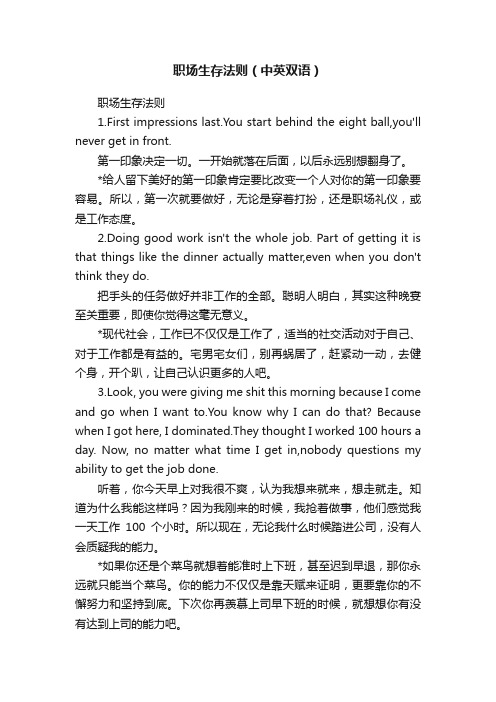
职场生存法则(中英双语)职场生存法则1.First impressions last.You start behind the eight ball,you'll never get in front.第一印象决定一切。
一开始就落在后面,以后永远别想翻身了。
*给人留下美好的第一印象肯定要比改变一个人对你的第一印象要容易。
所以,第一次就要做好,无论是穿着打扮,还是职场礼仪,或是工作态度。
2.Doing good work isn't the whole job. Part of getting it is that things like the dinner actually matter,even when you don't think they do.把手头的任务做好并非工作的全部。
聪明人明白,其实这种晚宴至关重要,即使你觉得这毫无意义。
*现代社会,工作已不仅仅是工作了,适当的社交活动对于自己、对于工作都是有益的。
宅男宅女们,别再蜗居了,赶紧动一动,去健个身,开个趴,让自己认识更多的人吧。
3.Look, you were giving me shit this morning because I come and go when I want to.You know why I can do that? Because when I got here, I dominated.They thought I worked 100 hours a day. Now, no matter what time I get in,nobody questions my ability to get the job done.听着,你今天早上对我很不爽,认为我想来就来,想走就走。
知道为什么我能这样吗?因为我刚来的时候,我抢着做事,他们感觉我一天工作100个小时。
所以现在,无论我什么时候踏进公司,没有人会质疑我的能力。
如何善于做决定的英语作文
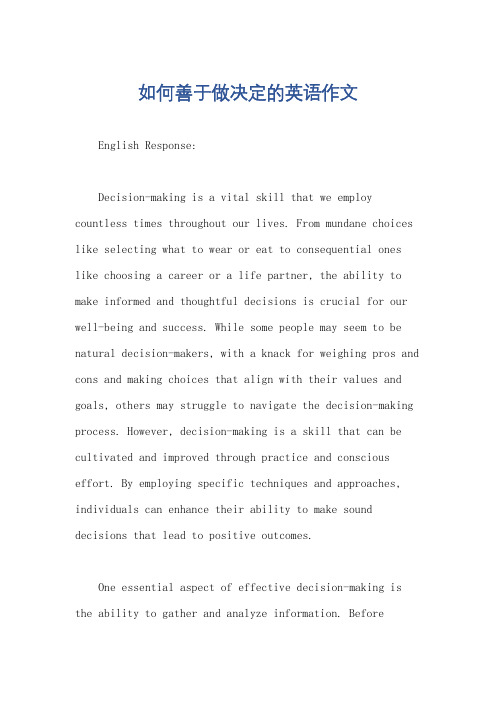
如何善于做决定的英语作文English Response:Decision-making is a vital skill that we employ countless times throughout our lives. From mundane choices like selecting what to wear or eat to consequential ones like choosing a career or a life partner, the ability to make informed and thoughtful decisions is crucial for our well-being and success. While some people may seem to be natural decision-makers, with a knack for weighing pros and cons and making choices that align with their values and goals, others may struggle to navigate the decision-making process. However, decision-making is a skill that can be cultivated and improved through practice and conscious effort. By employing specific techniques and approaches, individuals can enhance their ability to make sound decisions that lead to positive outcomes.One essential aspect of effective decision-making is the ability to gather and analyze information. Beforecommitting to a choice, it is important to take the time to research the options available, consult with knowledgeable individuals, and consider the potential consequences of each decision. This involves not only understanding the facts and data surrounding the decision but also being aware of one's own values, beliefs, and priorities. By aligning decisions with personal values, individuals can increase the likelihood of making choices that lead tolong-term satisfaction and fulfillment.Another key factor in decision-making is the ability to identify and evaluate biases. Cognitive biases are mental shortcuts that can lead to errors in judgment. They can stem from a variety of sources, including personal experiences, cultural norms, and emotional responses. By recognizing and understanding these biases, individuals can mitigate their influence on decision-making. This involves being aware of one's own tendencies, critically examining information, and seeking out diverse perspectives.Framing decisions in a way that promotes clear thinking is also essential. One technique commonly used in decision-making is the "pros and cons" list. By systematicallylisting the potential benefits and drawbacks of each option, individuals can weigh the evidence and make a more informed choice. Another approach is to consider the decision from different perspectives. This involves imagining thesituation from the vantage point of others, such as a colleague, family member, or future self. By expanding the frame of reference, individuals can gain a more comprehensive understanding of the potential implicationsof their choices.When faced with complex or high-stakes decisions, itcan be helpful to employ decision-making tools such as decision matrices or decision trees. These tools provide a structured and visual framework for evaluating options and making choices. By organizing information in a systematic manner, individuals can more easily compare and contrast different factors and identify the most appropriate courseof action.Practice is essential for improving decision-making skills. By consciously applying the techniques andapproaches discussed above, individuals can develop a more refined and effective decision-making process. It is important to note that decision-making is not always alinear or straightforward process. It may involverevisiting options, seeking additional information, or adjusting strategies. The ability to adapt to changing circumstances and learn from past decisions is also crucial for ongoing improvement.Effective decision-making is a skill that empowers individuals to navigate life's challenges, achieve their goals, and create a fulfilling future. By cultivating the ability to gather and analyze information, identify and evaluate biases, frame decisions effectively, and utilize decision-making tools, individuals can make choices that align with their values, promote well-being, and lead to positive outcomes.Chinese Response:决策是一项至关重要的技能,我们在一生中会无数次运用到它。
如何在生活中做出正确的选择英语作文

如何在生活中做出正确的选择英语作文全文共3篇示例,供读者参考篇1Making the right choices is an essential part of life, as the decisions we make can have a significant impact on our future. Whether it's choosing a career path, making financial decisions, or deciding on personal relationships, making the right choices can lead to success and happiness, while making the wrong choices can lead to regret and disappointment. In this essay, we will explore some strategies for making the correct choices in life.Firstly, it is crucial to gather information and consider all available options before making a decision. Researching the pros and cons of each choice can help you make an informed decision that aligns with your goals and values. Take the time to weigh the risks and benefits of each option, and consider seeking advice from trusted friends, family members, or professionals who may have experience or expertise in the area you are making a decision about.Secondly, it is important to listen to your intuition and trust your instincts. Sometimes, our gut feelings can guide us in theright direction, even when logic may point in another direction. Pay attention to how you feel about each option and consider how it aligns with your values, goals, and desires. If something doesn't feel right, it's essential to trust your instincts and explore other options.Thirdly, it can be helpful to set clear goals and priorities before making a decision. By knowing what is most important to you and what you hope to achieve, you can make choices that are in line with your long-term objectives. Consider how each option aligns with your goals and priorities, and choose the option that best supports your vision for the future.Additionally, it is essential to consider the potential consequences of each choice before making a decision. Think about how each option could impact your life and the lives of others, and consider whether you are willing to accept those consequences. By looking at the bigger picture and considering the long-term implications of your choices, you can make decisions that will benefit you in the long run.In conclusion, making the right choices in life is a skill that can be learned and developed over time. By gathering information, trusting your intuition, setting clear goals, and considering the consequences of your decisions, you can makechoices that will lead to success and happiness. Remember that no choice is entirely risk-free, but by using these strategies, you can increase the likelihood of making decisions that align with your values and goals. Trust yourself, be patient, and always strive to make choices that will bring you closer to the life you desire.篇2How to Make the Right Choices in LifeMaking important decisions in life can be challenging, as the choices we make can have a significant impact on our future. Whether it's deciding on a career path, choosing a life partner, or making everyday choices, it's essential to make the right decisions. Here are some tips on how to make the right choices in life.First, it's important to take the time to reflect on the decision at hand. Consider the potential outcomes of each choice and how it aligns with your values and goals. Think about what is truly important to you and how each option will help you achieve your long-term aspirations.Next, gather as much information as possible to make an informed decision. Research the options available to you, seekadvice from trusted friends or family members, and weigh the pros and cons of each alternative. The more information you have, the better equipped you will be to make a wise choice.Additionally, consider seeking advice from a mentor or counselor who can provide guidance and perspective. Sometimes, an outside perspective can help you see things more clearly and make a more rational decision.Another important aspect of making the right choices is listening to your intuition. Trust your gut feeling, as it can often guide you in the right direction. If something doesn't feel right, it's essential to listen to that inner voice and explore why you're feeling hesitant about a particular choice.Furthermore, consider the long-term consequences of your decision. Will this choice bring you closer to your goals and aspirations, or will it hinder your progress? Thinking about the future impact of your decision can help you make a choice that will benefit you in the long run.It's also crucial to be open to change and adaptability. Sometimes, the right choice may require stepping out of your comfort zone or taking a risk. Don't be afraid to embrace new opportunities and challenges, as they can lead to personal growth and development.Lastly, be decisive in your choices and take responsibility for the outcomes. Once you've made a decision, commit to it wholeheartedly and take ownership of the consequences. Learn from your experiences, whether they result in success or failure, and use them to inform future decisions.In conclusion, making the right choices in life requires careful consideration, reflection, and trust in your intuition. By seeking advice, gathering information, considering thelong-term impact, and being open to change, you can make decisions that align with your values and goals. Remember to be decisive and take ownership of your choices, as they ultimately shape your future.篇3How to Make the Right Choices in LifeMaking decisions is a crucial part of everyday life. From what to eat for breakfast to which career path to pursue, our choices shape the course of our lives. It is essential to make informed and thoughtful decisions in order to achieve our goals and live a fulfilling life. In this article, we will discuss some strategies for making the right choices in life.1. Clarify Your Values and GoalsThe first step in making the right choices is to understand your values and goals. What is important to you? What are you trying to achieve? Take the time to reflect on your values and priorities, and use them as a guide in making decisions. By aligning your choices with your values and goals, you can stay true to yourself and make decisions that are meaningful to you.2. Gather InformationBefore making a decision, it is important to gather as much information as possible. Research your options, weigh the pros and cons, and consider the potential consequences of each choice. Consult with trusted friends, family members, or mentors for their perspective. By arming yourself with knowledge, you can make a more informed decision.3. Trust Your InstinctsWhile it is essential to consider all the facts and information when making a decision, it is also important to trust your instincts. Your intuition can be a powerful tool in guiding you towards the right choice. If something feels off or doesn't sit right with you, pay attention to those feelings. Trusting your gut can lead you in the right direction.4. Consider the Long-Term EffectsWhen making a decision, it is crucial to consider thelong-term effects of your choice. How will this decision impact your future? Will it bring you closer to your goals or set you back? By looking at the big picture and considering the long-term consequences, you can make decisions that are in line with your values and aspirations.5. Seek Advice and FeedbackSometimes, it can be helpful to seek advice and feedback from others when making a decision. Consulting with a trusted friend, family member, or mentor can provide you with a different perspective and help you see things from a new angle. By seeking input from others, you can make a morewell-rounded decision.6. Practice MindfulnessMindfulness is the practice of being present and aware of your thoughts, feelings, and surroundings. By cultivating mindfulness, you can gain clarity and focus when making decisions. Take a moment to breathe and center yourself before making a choice. By being mindful, you can make decisions with a clear and calm mind.7. Learn from Your MistakesNo one makes the right choice every time. It is inevitable that you will make mistakes and face challenges along the way. When you do make a wrong decision, take the opportunity to learn from it. Understand what went wrong and how you can do better next time. By learning from your mistakes, you can grow and make better choices in the future.In conclusion, making the right choices in life is essential for achieving your goals and living a fulfilling life. By clarifying your values, gathering information, trusting your instincts, considering the long-term effects, seeking advice, practicing mindfulness, and learning from your mistakes, you can make informed and thoughtful decisions. Remember that every choice you make shapes your future, so choose wisely.。
职业经理人如何做出正确的选择(英文版).pptx
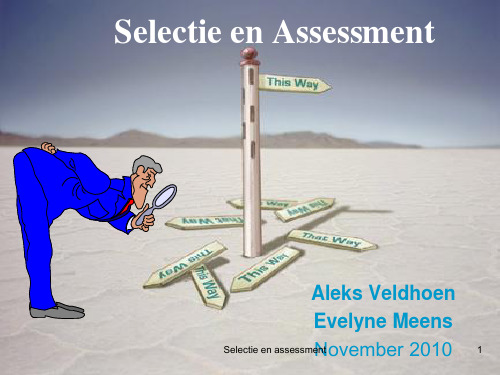
Maatschappij
Beoordelen
Selectie
Selectie en
Assessment
Instrumenten
De rechte man op de rechte plaats
Organisatie
Hanteren van instSruelemctieenenteanssessment
Perspectief maatschappij Perspectief individu
Iedereen deugt, maar waarvoor?
Perspectief organisatie
Selectie en assessment
2
Selectie en Assessment
S
O
M
Selectie en assessment
Assessment
Referenties
Psych. Tests
Assessment
De rechte man op de rechte plaats
Hanteren van instSruelemctieenenteanssessment
Diagnostiek Loopbaan en studiekeuze (deskundige) 7
historie van testen (projectieve testen)
cultuurtestje, normen en selectie bij allochtonen
positieve actie, voorkeursbeleid
Sollicitatiecode en klachten Selectie en assessment
如何做好经理英文作文
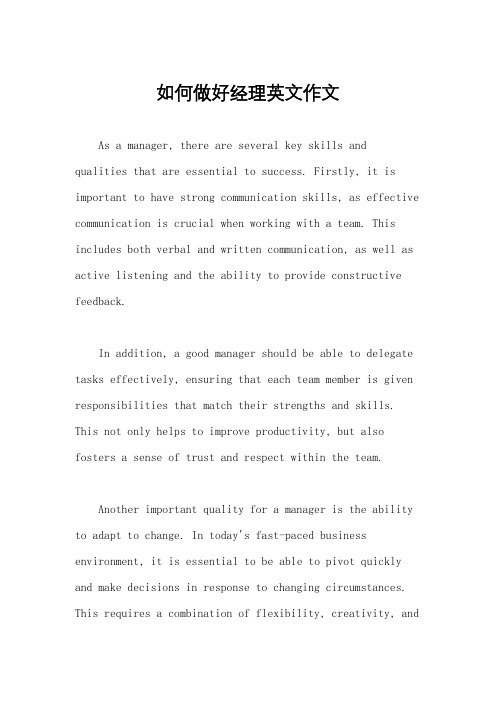
如何做好经理英文作文As a manager, there are several key skills andqualities that are essential to success. Firstly, it is important to have strong communication skills, as effective communication is crucial when working with a team. This includes both verbal and written communication, as well as active listening and the ability to provide constructive feedback.In addition, a good manager should be able to delegate tasks effectively, ensuring that each team member is given responsibilities that match their strengths and skills. This not only helps to improve productivity, but also fosters a sense of trust and respect within the team.Another important quality for a manager is the ability to adapt to change. In today's fast-paced business environment, it is essential to be able to pivot quickly and make decisions in response to changing circumstances. This requires a combination of flexibility, creativity, andstrategic thinking.Finally, a successful manager should have strong leadership skills, including the ability to inspire and motivate their team, set clear goals and expectations, and lead by example. This requires a combination of emotional intelligence, self-awareness, and a commitment to ongoing learning and development.Overall, being a good manager requires a combination of skills, qualities, and experience. By focusing on effective communication, delegation, adaptability, and leadership, managers can create a positive and productive work environment that helps their team achieve success.。
如何做出更好的职业选择英语作文

如何做出更好的职业选择英语作文Making Better Career Choices.Choosing a career path is one of the most significant decisions one makes in life. It involves considering various factors, such as interests, abilities, market trends, and personal values. Making a well-informed choice can lead to professional success and personal fulfillment. Conversely, an uninformed or impulsive decision can lead to disappointment and frustration. Here are some tips to help make better career choices.1. Self-Assessment:Understanding oneself is crucial in making career decisions. Identify your strengths, weaknesses, interests, and values. Consider what you excel at, what motivates you, and what you find fulfilling. A thorough self-assessment will help you narrow down potential career paths that align with your skills and aspirations.2. Market Research:Explore the job market and identify industries and roles that align with your interests and skills. Research the job requirements, salary ranges, and job prospects of different positions. Understanding the market trends and future projections can help you make informed decisions about your career path.3. Networking:Connect with industry professionals and mentors to gain insights into different careers. Attend career fairs, workshops, and seminars to meet people from different fields. Establishing relationships with industry experts can provide valuable advice and guidance in making career choices.4. hands-on Experience:Gain practical experience by participating ininternships, part-time jobs, or volunteer opportunities. Hands-on experience can help you understand the practical aspects of a particular career and decide if it aligns with your interests and abilities.5. Flexibility and Adaptability:Recognize that careers evolve over time, and be prepared to adapt to changes. The job market is constantly evolving, and it's important to be flexible and willing to learn new skills. Be open to opportunities that may arise and be proactive in seeking out new experiences.6. Goal Setting:Set clear and achievable career goals. Identify short-term and long-term objectives that align with your career aspirations. This will help you stay focused and motivated as you pursue your career path.7. Ongoing Learning:Commit to lifelong learning and professional development. Continuously upgrading your skills and knowledge will enhance your career prospects and keep you competitive in the job market. Participate in courses, workshops, and conferences to stay abreast of industry trends and advancements.8. Confidence and Persistence:Believe in yourself and your abilities. Have confidence in your career choices and be persistent in pursuing your goals. Face challenges and setbacks with determination and resilience, and be willing to seek help and support when needed.In conclusion, making better career choices requires a comprehensive understanding of oneself, the job market, and ongoing commitment to personal and professional growth. By taking the time to research, network, and gain practical experience, you can make informed decisions that lead to a fulfilling and successful career. Remember to stay flexible, set clear goals, and never stop learning. With these tips,you can navigate the career landscape confidently and achieve your professional aspirations.。
如何做出更好的决定英文作文
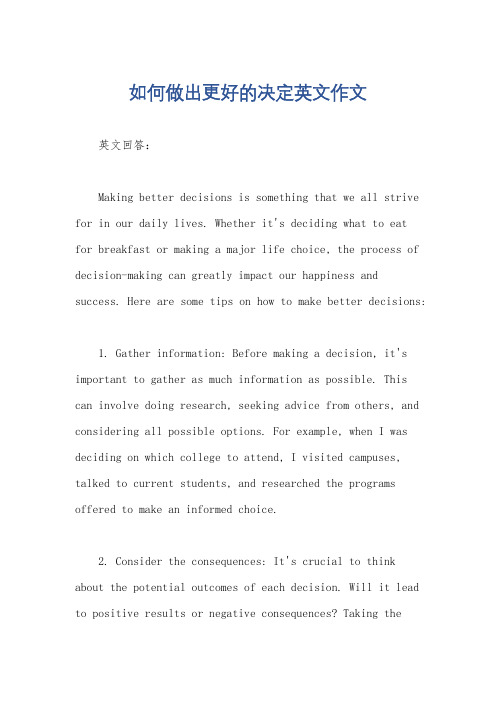
如何做出更好的决定英文作文英文回答:Making better decisions is something that we all strive for in our daily lives. Whether it's deciding what to eatfor breakfast or making a major life choice, the process of decision-making can greatly impact our happiness and success. Here are some tips on how to make better decisions:1. Gather information: Before making a decision, it's important to gather as much information as possible. This can involve doing research, seeking advice from others, and considering all possible options. For example, when I was deciding on which college to attend, I visited campuses, talked to current students, and researched the programs offered to make an informed choice.2. Consider the consequences: It's crucial to think about the potential outcomes of each decision. Will it lead to positive results or negative consequences? Taking thetime to weigh the pros and cons can help you make a more informed choice. For instance, when I was offered a job with a higher salary but longer hours, I had to consider if the extra money was worth sacrificing my free time.3. Trust your instincts: Sometimes, our gut feelings can guide us in the right direction. If something doesn't feel right, it's important to listen to your intuition. For example, when I was apartment hunting, I had a bad feeling about one particular place even though it had all the amenities I wanted. I trusted my instincts and ended up finding a better option that felt right.4. Seek advice: It's okay to ask for help when making decisions. Consulting with friends, family, or a mentor can provide valuable insights and perspectives that you may not have considered. When I was struggling to choose between two job offers, I sought advice from a trusted friend who helped me see the situation from a different angle.5. Take your time: Rushing into a decision can often lead to regrets. It's important to take the time to thinkthings through and not feel pressured to make a choice quickly. For example, when I was deciding whether to buy a new car, I took a few days to weigh my options, test drive different models, and consider my budget before making afinal decision.中文回答:做出更好的决定是我们在日常生活中都在努力追求的目标。
怎样做个经理呢英文作文
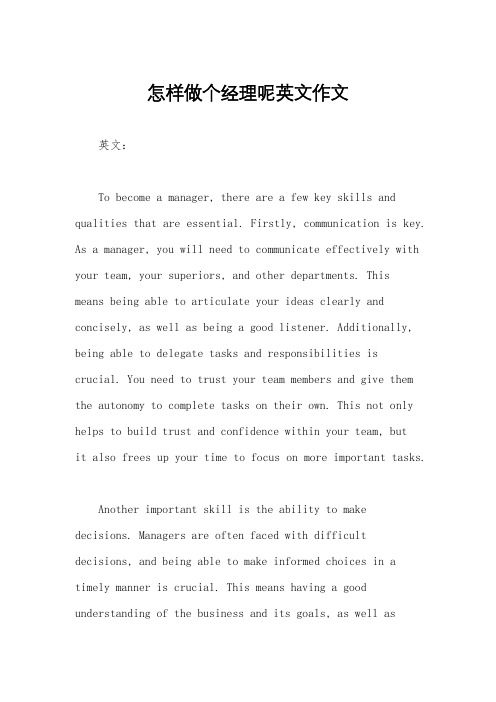
怎样做个经理呢英文作文英文:To become a manager, there are a few key skills and qualities that are essential. Firstly, communication is key. As a manager, you will need to communicate effectively with your team, your superiors, and other departments. This means being able to articulate your ideas clearly and concisely, as well as being a good listener. Additionally, being able to delegate tasks and responsibilities is crucial. You need to trust your team members and give them the autonomy to complete tasks on their own. This not only helps to build trust and confidence within your team, butit also frees up your time to focus on more important tasks.Another important skill is the ability to make decisions. Managers are often faced with difficult decisions, and being able to make informed choices in a timely manner is crucial. This means having a good understanding of the business and its goals, as well asbeing able to analyze data and weigh the pros and cons of different options.Finally, being a good leader is essential. This means setting a positive example for your team, being approachable and supportive, and inspiring your team towork towards a common goal. A good leader is also able to motivate their team and provide constructive feedback to help them improve.中文:想要成为一名经理,有几个关键的技能和素质是必不可少的。
如何做好决策英语作文

如何做好决策英语作文英文回答:Making well-informed decisions is an essential skillthat can positively impact our personal and professional lives. Effective decision-making involves a structured and thoughtful process that considers various factors,evaluates options, and identifies the best course of action. Here are some key steps to guide you in making well-informed decisions:1. Define the Problem or Opportunity: Clearly identify the issue or opportunity you are facing. Gather relevant information and understand the context to frame the problem or opportunity accurately.2. Gather Information: Conduct thorough research to collect data, facts, and perspectives from multiple sources. Consult with experts, review documents, and exploredifferent viewpoints to gain a comprehensive understandingof the situation.3. Identify Alternatives: Generate multiple potential solutions or options. Consider a wide range of possibilities, both conventional and unconventional, to ensure you have a diverse set of alternatives to evaluate.4. Evaluate Options: Analyze each alternative systematically using relevant criteria. Consider the potential benefits, risks, costs, and feasibility of each option. Use decision-making tools such as pros and cons lists, decision matrices, or weighted criteria assessments to facilitate the evaluation process.5. Consider Long-Term Consequences: Think beyond the immediate outcomes and consider the long-term implications of your decision. Assess how each alternative aligns with your values, goals, and strategic objectives.6. Seek Input from Others: Consult with trusted individuals, colleagues, or experts to gain diverse perspectives and insights. Seek feedback, challenge yourassumptions, and consider different viewpoints to refine your decision-making process.7. Make a Decision and Implement: Once you have carefully evaluated the options, make a clear decision and take ownership of it. Develop an action plan to implement the decision effectively and monitor the outcomes.Making well-informed decisions requires patience, critical thinking, and a willingness to consider multiple perspectives. By following these steps, you can increase the likelihood of making decisions that lead to positive outcomes and support your long-term goals.中文回答:如何做出明智的决策。
如何正确做决定英语作文
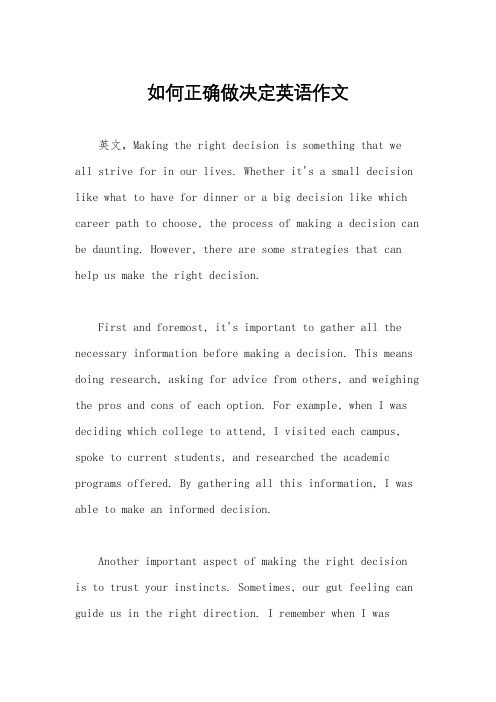
如何正确做决定英语作文英文,Making the right decision is something that weall strive for in our lives. Whether it's a small decision like what to have for dinner or a big decision like which career path to choose, the process of making a decision can be daunting. However, there are some strategies that can help us make the right decision.First and foremost, it's important to gather all the necessary information before making a decision. This means doing research, asking for advice from others, and weighing the pros and cons of each option. For example, when I was deciding which college to attend, I visited each campus, spoke to current students, and researched the academic programs offered. By gathering all this information, I was able to make an informed decision.Another important aspect of making the right decision is to trust your instincts. Sometimes, our gut feeling can guide us in the right direction. I remember when I wasdeciding whether to take a job offer, even though it seemed like a great opportunity on paper, something didn't feel right. I trusted my instincts and turned down the offer, only to later find out that the company had financial troubles.Furthermore, it's crucial to consider the long-term effects of the decision. Will this decision benefit me in the long run, or will it only provide short-term satisfaction? For instance, when I was deciding whether to buy a new car, I had to consider not only the initial cost but also the long-term maintenance and insurance expenses.In addition, seeking advice from others can also be beneficial in making the right decision. Sometimes, a fresh perspective from someone else can shed light on aspectsthat we may have overlooked. When I was deciding whether to move to a new city for a job opportunity, I sought advice from friends and family who had experience with similar situations. Their input helped me weigh the pros and cons more effectively.Finally, it's important to be decisive and take action once a decision has been made. Procrastinating can lead to missed opportunities and regrets. It's important to have confidence in the decision that has been made and move forward with it.中文,做出正确的决定是我们生活中都在努力追求的事情。
职业经理人如何做出正确的选择(英文版)

Ethiek bij Selectie en assessment
S
O
M
belangentegenstellingen
en morele debatten
Selectie en assessment
Discriminatie Selectie en assessment
Ethiek
Sollicitatiecode NVP
4TP en/of NIP code
eisen met betrekking tot
– voorlichting, – onderzoek en – rapportage
Selectie en assessment
Ethiek bij Selectie en assessment
historie van testen (projectieve testen)
Selectie en Assessment
1. Selectiefunctionaris 2. Intercedent 3. Loopbaanadviseur 4. Decaan
5. Studie- en beroepskeuzeadviseur 6. Re-integratieadviseur Selectie en assessment
Peerassessment (beoordelen van elkaars portfolio) Gedrag beoordelen. Laatste vragen.
Brief en CV aanpassen op feedback.
Gesprek voorbereiden als sollicitant en selecteur
职业经理人如何做出正 确的选择(英文版)
怎样做明智的选择英语作文

Making wise choices is an essential skill in life that can significantly impact our personal and professional development. Here are some key points to consider when making decisions that can lead to better outcomes:1. Define Your Goals: Before making any choice, its crucial to have a clear understanding of what you want to achieve. Knowing your longterm and shortterm goals can help you make decisions that align with your aspirations.2. Gather Information: In the age of information, theres no excuse for making uninformed decisions. Research thoroughly to understand all aspects of the choice youre about to make. This includes understanding the pros and cons, potential risks, and benefits.3. Consider the Consequences: Every choice has consequences, both positive and negative. Weigh the potential outcomes and consider how they will affect you in the short and long term.4. Seek Advice: Dont hesitate to seek advice from people you trust. They can provide different perspectives and insights that you may not have considered.5. Reflect on Your Values: Your personal values should guide your decisions. If a choice aligns with your values, its more likely to bring satisfaction and fulfillment.6. Evaluate Your Options: List your options and evaluate them based on various criteria such as feasibility, cost, time, and potential return on investment.7. Trust Your Intuition: Sometimes, your gut feeling can be a powerful guide. If youve done your research and still feel drawn to a particular choice, trust your instincts.8. Be Decisive: Once youve made a decision, commit to it. Indecisiveness can lead to missed opportunities and unnecessary stress.9. Learn from Experience: Not every decision will be perfect. Learn from your mistakes and successes to improve your decisionmaking skills over time.10. Stay Flexible: Be open to change. If new information arises or circumstances change, be willing to reassess and adjust your decision if necessary.In conclusion, making wise choices involves a combination of careful planning, informed decisionmaking, and the courage to act. By considering these points, you can increase the likelihood of making decisions that lead to positive outcomes and personal growth.。
- 1、下载文档前请自行甄别文档内容的完整性,平台不提供额外的编辑、内容补充、找答案等附加服务。
- 2、"仅部分预览"的文档,不可在线预览部分如存在完整性等问题,可反馈申请退款(可完整预览的文档不适用该条件!)。
- 3、如文档侵犯您的权益,请联系客服反馈,我们会尽快为您处理(人工客服工作时间:9:00-18:30)。
Discriminatie
Ethiek
Sollicitatiecode NVP 4TP en/of NIP code eisen met betrekking tot
– voorlichting, – onderzoek en – rapportage
Ethiek bij Selectie en assessment
discriminatie cultuur
Beoordelen prestaties
functioneren (baas)
Selectie Functie eisen
Werving
Organisatie
Instrumenten
Selectie en
Sollicitatiebrieven Biografische data
5. Studie- en beroepskeuzeadviseur 6. Re-integratieadviseur
Mogelijkheden en beperkingen
Tests Gesprekken Biografische gegevens Assessment
Maatschappij codes en wetten
6 Leerboek HRM H 4 Sollicitatiecode
7 Alles over werven & selecteren H16
8 Inleveren portfolio
Capaciteitentesten maken. Feedback op elkaars cv geven. Persoonlijkheidstesten maken. Testresultaten koppelen aan de functie. Oefenen van gesprek
Selectie en Assessment
Aleks Veldhoen Evelyne Meens November 2010
Beoordelen B van (B)OZO
De juiste m/v op de juiste werkplek!
Wat wil jij? Willen wij jou?
Iedereen deugt, maar waarvoor?
Perspectief maatschappij Perspectief individu
Perspectief organisatie
Selectie en Assessment
S
O
M
Selectie en Assessment
1. Selectiefunctionaris 2. Intercedent 3. Loopbaanadviseur 4. Decaan
Portfolio bijwerken en meenemen volgende week
Reflectie schrijven met o.a. feedback vanuit werkcollege
Portfolio voltooien
IKT en deelopdracht 4
Gesloten kennistoets
Handen in het haar? Outplacement? Midlife?
Voetangels en klemmen
Ethiek
Ethiek bij Selectie en assessment
S
O
M
belangentegenstellingen
en morele debatten
Maatschappij
Beoordelen
Selectie
Selectie en
Assessment
Instrumenten
De rechte man op de rechte plaats
Organisatie
Hanteren van instrumenten
Diagnostiek
Willen wij jou?
Huiswerk
Functie uitzoeken
Brief en CV afmaken.
3 Alles over werven & selecteren H12
4 Alles over werven & selecteren H 9, 10,11
5 Alles over werven & selecteren H 13, 14,15
Selectie interview of intakegesprek (anamnese)
Psychologische tests
– Interesse tests – Persoonlijkheidstests – Capaciteitentests
Assessment
Assessment
assessment, arbeidsproef en observatie.
historie van testen (projectieve testen)
cultuurtestje, normen en selectie bij allochtonen positieve actie, voorkeursbeleid Sollicitatiecode en klachten
Hoorcollege
1 Alles over werven & selecteren H 1, 3, 4
2 Alles over werven & selecteren H8
Werkcollege
Introductie deelopdracht 4. Kiezen van functies
Beginnen met portfolio: Brief en CV
Peerassessment (beoordelen van elkaars portfolio) Gedrag beoordelen. Laatste vragen.
Brief en CV aanpassen op feedback.
Gesprek voorbereiden als sollicitant en selecteur
Informatie vooraf verstrekt door individu
Sollicitatiebrief Referenties Curriculum Vitae (c.v.) Sollicitatieformulier
Informatie verkregen tijdens procedure
Portfolio met de opdrachten, testresultaten en reflecties
Handen in het haar? Kweenie?
Programma vervolg
College: CV en sollicitatiebrief Enkele selectiefouten (onderzoek Starjob) Identificeren functie eisen (video voorbeeld)
Interviews
Assessment
Referenties
Psych. Tests
Assessment
De rechte man op de rechte plaats
Hanteren van instrumenten
Diagnostiek Loopbaan en studiekeuze (deskundige)
